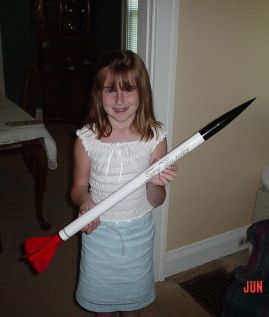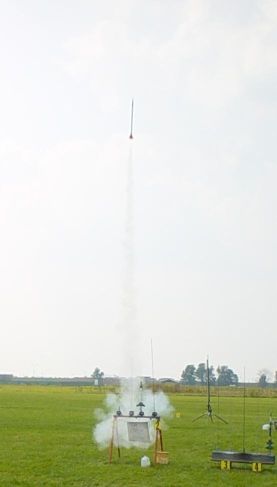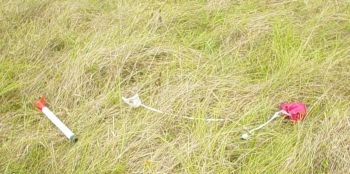| Construction Rating: | starstarstarstarstar |
| Flight Rating: | starstarstarstarstar |
| Overall Rating: | starstarstarstarstar |
| Manufacturer: | Estes  |

Brief:
The Estes Sky Raider was among a handful of D-powered rockets that I always
longed for as a kid. (The Renegade and Demon were two others.) I loved it's
size and the cool lightning bolt inspired decals. Back then I also loved the
idea of flying D-powered birds but not the economics. I was subsisting on a
meager allowance and a pack of C6-5s took a pretty big chunk out of that, so I
left the D-powered stuff alone. With motors and, more importantly, motor cash
in more plentiful supply these days, I've begun to clone as many of the older D
kits as time permits. The Estes Goblin became my first D-powered clone, but the
Sky Raider was a close second.
Construction:
Sky Raider plans are available
here
- 27" BT-55 body tube from Totally Tubular
- 2.75" BT-50 engine tube from Totally Tubular
- EH-2 engine hook
- 3 AR-5055 centering rings from a Red Arrow Hobbies assortment
- AR-2050 engine block/centering ring from Red Arrow Hobbies assortment
- PNC-55AC nose cone from Hobbylinc
- medium snap swivel
- 36" Kevlar® shock cord
- 3" x 3" square of Kevlar® Perma-Wadding
- 36" of 1/8" sewing elastic for shock cord
- 12" nylon chute
- 3/32" basswood fin stock
- 2 launch lugs
- decal sheet
 While it's good looks are what initially attracted me to the Sky
Raider, the simplicity of the design was what made this project as enjoyable as
I found it to be. Basically a long, lean 4FNC rocket, the Sky Raider was
initially built as a payload capable rocket with an 18" and 9" BT-55
joined by a balsa nose block. Since it is now illegal to launch any living
creatures as payload fodder, a lot of the fun has gone out of it, so I chose to
rid my clone of it's payload section and make the entire body from one 27"
length of Totally Tubular BT-55. This simplified construction somewhat without
sacrificing the lines of the original rocket. To look at it, you'd never know I
made the switch.
While it's good looks are what initially attracted me to the Sky
Raider, the simplicity of the design was what made this project as enjoyable as
I found it to be. Basically a long, lean 4FNC rocket, the Sky Raider was
initially built as a payload capable rocket with an 18" and 9" BT-55
joined by a balsa nose block. Since it is now illegal to launch any living
creatures as payload fodder, a lot of the fun has gone out of it, so I chose to
rid my clone of it's payload section and make the entire body from one 27"
length of Totally Tubular BT-55. This simplified construction somewhat without
sacrificing the lines of the original rocket. To look at it, you'd never know I
made the switch.
Aside from this, the only changes I made were the obligatory addition of Kevlar® to the recovery system, and adding a third AR-5055 centering ring to act as a hold down for the engine hook. The Kevlar® was installed as usual, by tying a knot in one end and slipping it between the forward centering ring and the motor tube. When securely held in place with wood glue, this gives the rocket a much stronger anchor point than the traditional Estes paper mount and keeps the elastic shock cord well out of the way of the hot ejection gases. When combined with the square of Kevlar® Perma-Wadding, the recovery system is almost foolproof.
 Finishing:
Finishing:
Finishing was greatly simplified by the replacement of the balsa fins with
stronger basswood. While strength is one advantage of basswood, the bigger
advantage is probably achieved in finishing. The tighter grain of the basswood
makes for a much easier finishing experience as the fins are filled to a glass
smooth finish after only two coats of thinned Elmer's Fill n Finish. This was
also used on the body tube spirals and despite the LONG strokes needed to
properly sand the body tube, the process was greatly simplified overall. Once
the body was sanded to near "perfection", I sprayed the whole thing
with two coats of Valspar primer, sanding lightly between each coat. I then
sprayed the entire rocket with Valspar gloss white before masking the top of
the rocket for it's coat of Valspar gloss black, and masking the bottom for
it's coat of Valspar Apple Red. The whole thing came out looking as close to
the catalog photo as I dared hope. I made the decals using BelDecal ink jet
paper and my HP printer and they came out looking great. After applying the
decals, I sprayed the entire rocket with a coat of clear acrylic. Once this was
dry, all that was left to do was fly it.
Construction Rating: 5 out of 5
 Flight:
Flight:
Flight #1 was on an Estes D12-7 in mild winds. At lift-off, the Sky Raider
fired straight and true, coasting upward for what seemed like forever before
the ejection charge fired. It drifted only slightly in the light winds and
nearly landed on a Subaru that was parked behind the flight line, also just
missing the dreaded access road that has claimed more than one of my rockets.
Flight #2 was in heavier winds on 4th of July weekend. With the pad pointed
well into the wind to compensate for the unavoidable drift to come, the rocket
again had an impressive flight on a D12-7. After coasting out toward the
southern edge of the park, it came screaming back in across the flight line,
clearing us by well over a hundred feet. It landed well back in the cat tails,
and like a genius I had worn shorts. Flight #3 was the best overall flight and
almost as importantly it gave me the best launch picture. Flying in near calm
conditions on a D12-5, the Sky Raider ejected it's chute just as it's forward
motion stopped, a picture perfect recovery. Then to top the flight off, it
landed just a few feet off of a newly mown path off to the right side of the
VOA field. Recoveries should always be that easy.
Recovery:
With three feet of Kevlar®
shock cord tied and glued securely in behind the forward centering ring and
another three feet of 1/8" sewing elastic on the nose cone end, I feel
like I can rest easy as far as the recovery system is concerned. Call it
overkill, but the body tube has the space to carry the extra shock cord. A
sheet of Perma-Wadding keeps the whole system fool proof as I have occasionally
been known to forget the dog barf. I have swapped out the traditional 18"
Estes parachute for a smaller 12" nylon chute that came in a box of eBay
winnings. So far it has been more than adequate, especially showing it's value
in heavy winds. The only problem with this smaller chute might be the speed
with which the rocket comes in, but with the bulk of VOA covered by heavy
overgrowth, this would probably only be a problem if the Sky Raider lands on
the access road, and damage is inevitable no matter how big your chute is in
that case.

Flight Rating: 5 out of 5
Summary:
From a performance standpoint, the Sky Raider has turned out to be everything I
had hoped it would be. Definitely not a small field flier, I've only flown it
during QUARK launches at VOA Park. While the field at VOA isn't without it's
hazards, it does have a large amount of open land for a comparatively high
flying bird like this one to recover. The Sky Raider is another example of
Estes doing it right back in the day.
PRO'S: Vintage looks, ease of construction, and D-powered flights are always cool.
CON'S: None. All parts are readily available to clone this classic.
Overall Rating: 5 out of 5
 |
 |
Flights
Sponsored Ads
 |
 |











